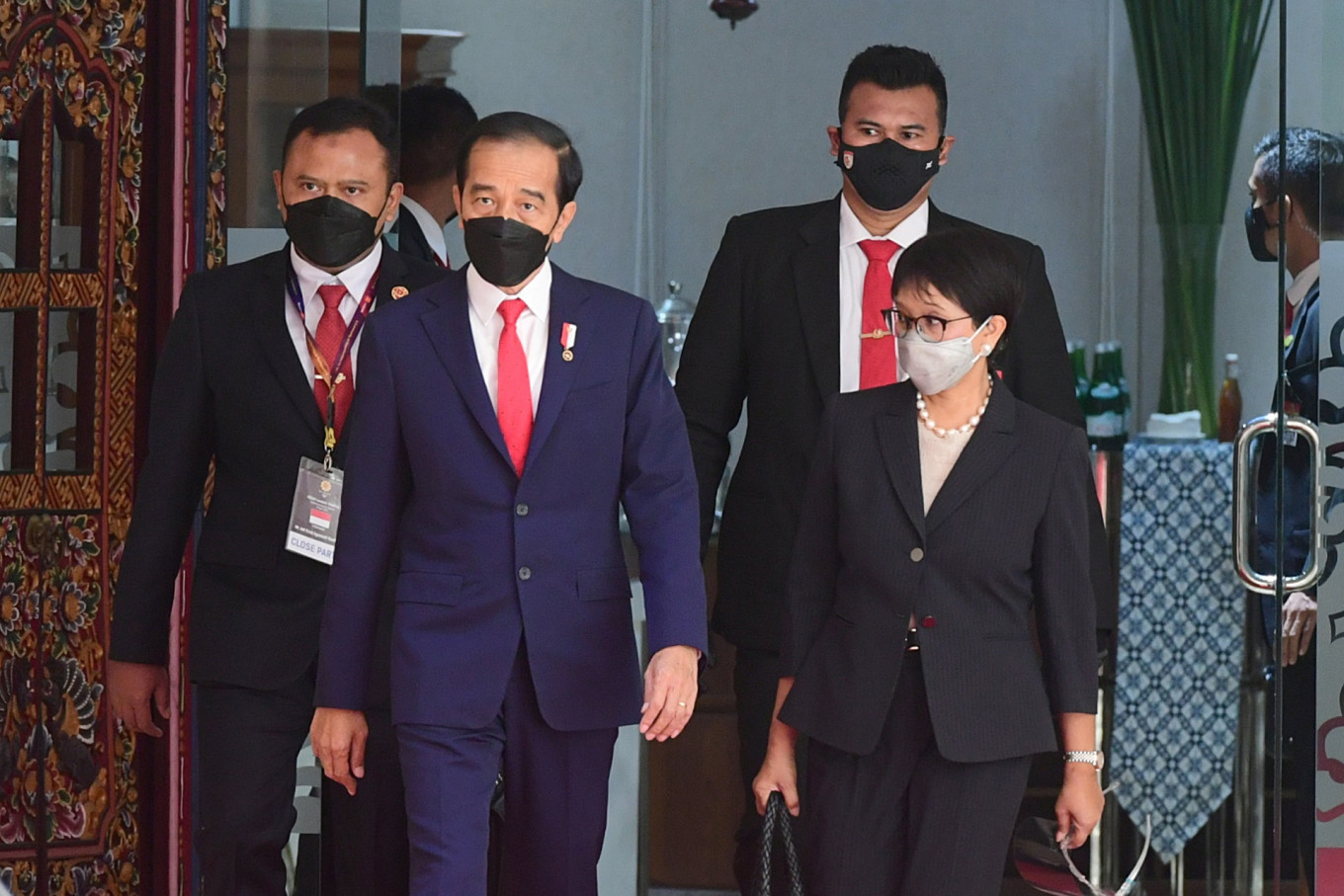Popular Reads
Top Results
Can't find what you're looking for?
View all search resultsPopular Reads
Top Results
Can't find what you're looking for?
View all search resultsASEAN must not be pawn in US-China rivalry: Retno
The great power rivalry between US and China, she said, could sow discord within the group.
Change text size
Gift Premium Articles
to Anyone
A
SEAN must have a strong role in regional dynamics to avoid being used as a “pawn” in the geopolitical rivalry between the United States and China, Indonesia’s top diplomat has said, as the association’s premier fora continue to host verbal skirmishes between the two powers.
Foreign Minister Retno Marsudi said on ASEAN’s 54th anniversary on Sunday that although most member states were focusing on containing COVID-19, the pandemic was not the only challenge the regional bloc faced. The great power rivalry between US and China, she said, could sow discord within the group.
“Rather than being a pawn in this new Cold War, ASEAN must be in the driver’s seat to shape regional dynamics. We must promote principles and values enshrined in ASEAN’s Outlook on the Indo-Pacific region to guide other countries in their engagement with our region,” Retno said.
In the first week of August, top ASEAN diplomats met with their counterparts from the bloc’s dialogue partners, including China, Japan and South Korea, at the ASEAN-plus-three ministerial meeting, as well as at the East Asia Summit (EAS) and the ASEAN Regional Forum (ARF).
The EAS is an ASEAN leadership forum consisting of 18 countries, including Australia, China, India, Japan, New Zealand, South Korea, the US and Russia. Representatives discuss strategic, political and economic issues in the region.
The annual ARF, meanwhile, is intended to promote open dialogue on political and security cooperation. Its 27 participants include Canada, North Korea, the European Union, Pakistan and Sri Lanka.
Concerns over scaled-back diplomatic engagement at the fora, which were held online this year, were dispelled as countries raised sensitive issues with each other and the ongoing US-China tensions cast a shadow over events.
Chinese Ambassador to ASEAN Deng Xijun claimed the United States and its allies had made “groundless accusations” at the EAS and the ARF over human rights issues in Xinjiang and Hong Kong.
“Their smearing didn’t get any echoes from ASEAN countries, was hard to sell – if not impossible – in the East Asia cooperation platforms and is completely self-proclaimed and self-defeating,” he said at a press briefing on Monday.
US Secretary of State Anthony Blinken had raised “serious concerns” over China’s alleged human rights abuses against the minority Muslim Uighur group in Xinjiang, as well as violations in Tibet and Hong Kong.
The Xinjiang issue and the democracy movement in Hong Kong are sensitive topics for China, and ASEAN member states rarely publicly comment on them.
Allegations of human rights abuses against the Uighur people have gained traction in Indonesia since 2018, particularly in the country’s Muslim communities, but Beijing has launched charm offensives directed at Indonesian Muslim leaders, which have included organizing free trips to China’s westernmost province.
Blinken also raised the US’ “deep concern” over the rapid growth of China’s nuclear arsenal and called on Beijing to cease its “provocative behavior” in the South China Sea.
Southeast Asian nations have found themselves in a standoff with China in the South China Sea, a strategic body of water where the Philippines, Brunei Darussalam, Malaysia and Vietnam have maritime claims. Beijing has been aggressively pushing its overlapping claims in the area with an increased military presence.
Incidents between Chinese authorities and authorities from the Philippines, Malaysia, Vietnam and Indonesia have raised the stakes in negotiations between ASEAN and China on the establishment of a Code of Conduct (COC) for the South China Sea.
In June, an ASEAN-China senior officials’ meeting was held in person on the sidelines of the Special Foreign Ministers’ Meeting in Chongqing, where the parties agreed to resume the second reading of the draft text.
After two online meetings, ASEAN and Chinese foreign ministers announced that the preamble of the COC had been provisionally agreed upon.










